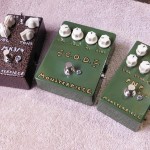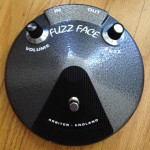In the world of boutique fuzz pedal effects, Analog Man Mike Piera’s creations are among the most well-known and respected due to his attention to detail. His Sun Face fuzz is his most popular and based on the original Arbiter England Fuzz Face which was first introduced in 1966, but unlike the original which was built with a range of poorly matched components and haphazard quality control, Piera’s are built like finely tuned machines with every component being carefully measured and tested. Fuzz connoisseurs like Eric Johnson have reportedly gone through hundreds of Face Faces until finding just the right one. In any fuzz based around germanium transistors, proper matching, leakage testing, and biasing are all critical in order to get the most musical and harmonically rich fuzz.
Tag Archives: Dallas Arbiter
Last Boutique Builder Standing: Richard Coibion of Monsterpiece Fuzz
Richard Coibion was hit by the effects building bug back in 2001. With a background  and education in electronics engineering and having a steady career in IT, Coibion dabbled in modifying fuzz circuits and tuned them to his liking. He hadn’t ever considered making a career out of building effects however.
and education in electronics engineering and having a steady career in IT, Coibion dabbled in modifying fuzz circuits and tuned them to his liking. He hadn’t ever considered making a career out of building effects however.
Read More »
Sonus Pedals Fuzz Face 1966 Replica Reviewed
It has been some time since we wrote our Fuzz Feast series about both vintage and  recent fuzz options on the market. After seeing the prices of original fuzz units climb, I wondered what the boutique market now had available in 2015 as far as the most accurate of Fuzz Face clones. During my search, I stumbled across Sonus Pedals based in the Netherlands and its Fuzz Face 1966 replica.
recent fuzz options on the market. After seeing the prices of original fuzz units climb, I wondered what the boutique market now had available in 2015 as far as the most accurate of Fuzz Face clones. During my search, I stumbled across Sonus Pedals based in the Netherlands and its Fuzz Face 1966 replica.
Read More »
Fuzz Feast Part 1 – An Examination of Vintage Fuzz Boxes
I have a confession. As a guitarist for well over 25 years, I had always been an “anti-fuzz” person. In fact, I can honestly say I hated and despised the sound of fuzzes that I had heard. I couldn’t understand the point of purposefully making a guitar sound as atrocious and “lo-fi” as possible in mind. A fuzz tone after all, sounded nothing like an electric guitar should.
During this period of time, my search for the epitome of rock tone had to do with capturing rock guitar tones from the likes of players like Angus Young of AC/DC and of course Edward Van Halen. In my mind, any tone that deviated from those was simply bad tone, or at best, “sub-par.”
Read More »